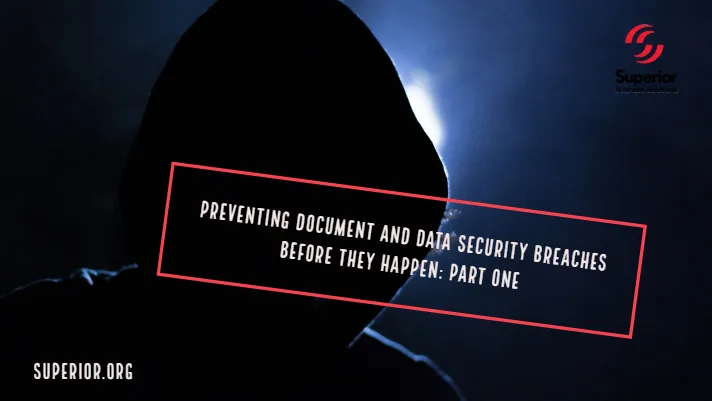It Can Happen to Any Business. But It Doesn’t Have to Happen to YOURS.
In Thursday’s post, I mentioned ten of the most noteworthy data breaches that have happened already in 2018. I’d love to say I didn’t mean to scare you, but I did. That’s because we at Superior Business Solutions have helped businesses thrive for nearly 100 years. And today, doing that includes helping you take data security seriously to protect your business from modern threats, from both cyber and other incidents.
Some data security breaches I mentioned involved huge companies with massive client lists. Those breaches impacted stunning numbers of people. Others earned a mention because they were familiar names, like Panera, Saks Fifth Avenue, and the U.S. Air Force.
Here’s one more case worth noting. Aetna, another well-known company, paid a $17 million settlement for a data security mishap unrelated to any digital subterfuge. A letter mailed to 12,000 HIV patients (ironically about a previous settlement) exposed their use of HIV drugs through a large window in the mailing envelope. Not so much diabolical but certainly dumb.
You Are Vulnerable—Until You Are Protected
Are you protected sufficiently from a document and data security breach? If you can answer a confident ‘yes” then good for you. If you can’t, assume you are “data insecure” and take steps to change that.
There are several places in your operation where data and document security can be compromised. (More on that in a moment.) But let’s talk first about the most important step you can take. That critical step is aligning yourself with partners that have the most advanced credentials in providing data security.
How to Assess Security Competence in a Potential Data Security Partner
Those credentials, of course, start with expertise and experience. Has the partner dealt with a wide range of data security situations for a diverse group of companies? Can that partner demonstrate its ability to ensure data and document security across a range of financial and data-heavy transactions, for companies of many sizes and in many industries?
Further, does that partner meet industry standard certifications for data security? Does it comply with SSAE 18 (the upgraded protocol in Statement and Standards for Attestation Engagement)? Is it also compliant with other standards accreditation bodies, such as ANSI, NIST, HIPAA and others? Has its security architecture been designed to extend complete end-to-end protection to all data for which it is responsible?
Partnering with SBS and DDC for Document and Data Security
At Superior, we partner with Digital Data Centers(DDC) to provide data and document security for customers and clients. I know “state-of-the-art” sounds like a cliché but it describes the proprietary systems and methodologies that DDC has designed to provide maximum protection for client data. Our long relationship with DDC is built on their track record for living up to demanding standards in an area so critical to all the businesses we represent.
In Thursday’s post, I will go into a bit more detail on the two primary areas in which data security can be compromised. It turns out that the most risks come in one of two areas:
-
how data is handled (data transmission)
-
how data reported and distributed (document mailing, electronic and print)
DDC has you covered on both fronts. Be sure to check in for part two on Thursday to learn more.
Securing Your Business Success in Many Ways
I mentioned that Superior has been assisting businesses like yours for almost a century. We’ve stayed in front of the latest trends, technologies and tools that help your business operate more effectively and efficiently. That covers a lot of ground, from turning prospects into customers to turning away prospective data thieves.
Our commitment to demanding standards has earned us an ISO certification that makes us trustworthy partners. And our two consecutive “Best of Print and Digital” awards show that it makes a measurable difference to our customers. Contact Superior today to learn what we can do for your business. A free data security audit could be a lifesaver for your business, so why don’t we start there today?
And check back in on my next post for part two in this series.


